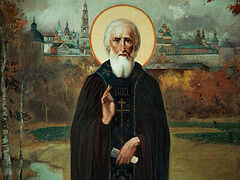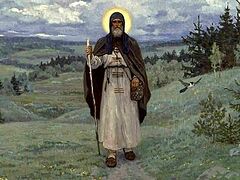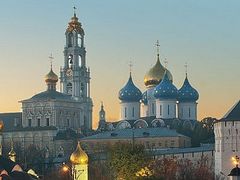On the eve of the summer feast-day of St. Sergius of Radonezh, the uncovering of his holy relics, Hieromonk Nektary (Sokolov) from the Holy Trinity-St. Sergius Lavra talked about contemporary life in the monastery and the spiritual role of St. Sergius of Radonezh in the history of the Russian nation. He shares with our readers some amazing conversion stories that took place at the saint’s relics.
 —Father Nektary, our life is so fleeting that we often have just a formal attitude towards Church history and the events of our liturgical year. But after all, St. Sergius of Radonezh is a phenomenon that goes beyond our everyday Christian life—he is a very special saint whom we have gotten used to. And we speak about him in simple words, often without even thinking about what he really means to us.
—Father Nektary, our life is so fleeting that we often have just a formal attitude towards Church history and the events of our liturgical year. But after all, St. Sergius of Radonezh is a phenomenon that goes beyond our everyday Christian life—he is a very special saint whom we have gotten used to. And we speak about him in simple words, often without even thinking about what he really means to us.
—Indeed, St. Sergius is one of the most important and beloved saints of the Russian people, and we are still grateful to him for everything he did for our Fatherland. And he continues to help us—not only our country, but also each of us individually, provided we turn to him in prayer from the bottom of our hearts.
—I keep asking myself: why did young Bartholomew (the future St. Sergius) come here, to this wilderness? He more or less tried to “bury himself” in this dense forest...
—You and I know that Except a corn of wheat fall into the ground and die, it abideth alone: but if it die, it bringeth forth much fruit (Jn. 12:24). You first really need to die to this world in order to serve it and contribute to its spiritual transformation later. To do so you must first be transformed spiritually. And this was necessary for St. Sergius as well. He needed to see himself, his fallen human nature, repent and through spiritual warfare cleanse his soul from all kinds of passions that suck the lifeblood out of us, directing our attention to vain and earthly things instead of allowing us to aspire to heavenly, lofty and sublime things. He needed to get rid of the fears that constantly torment and disturb every human being, to learn to see and overcome them.
All this had to happen to Bartholomew here, in the wilderness and austere conditions so that, hardened by adversity, sorrows and the ordeals of the desert, he could acquire completely new qualities, becoming a transformed and spiritual person adopted by Christ and bearing His image, characteristics and grace in his heart. This was vital and, fortunately, happened to the future venerable father. And this transformation continues to impact all of us.
—Monastics are often reproached for a kind of egotism: “You have found a quiet haven, striving to save your souls. But you don’t care about others at all!”
Surely St. Sergius did not think that he would become a role model for someone, found a large monastery and even become a father for countless spiritual children, many of whom would later serve as abbots of various monasteries in Russia. Perhaps he thought above all about his personal salvation. Or did the Lord reveal to him something about his future at the very beginning?
—I think that when a person does something, he doesn’t make such global plans for the future. In my view, this would just be the product of vanity and pride. As for St. Sergius, the words of another Russian saint, who greatly venerated him and was even buried with his enameled icon on his chest, apply to him. I am speaking of St. Seraphim of Sarov, who said, “I have commended my life to the hands of God, just as iron is placed in the forge.” That is, a person voluntarily becomes like molten metal, “heated” by temptations and sorrows, and exposes himself to the bows of a “sledge hammer” aimed at forming him into something absolutely new, something he previously didn’t even think about. And in the end, he chooses a path that he probably wouldn’t dare to follow were he to know in advance all that he would have to overcome. Therefore, I believe that St. Sergius didn’t really think anything special about himself, that “something would happen” to him. The Holy Fathers said that when a person fantasizes about himself, his fantasties definitely do not come true.
And as for St. Sergius, of course, he sought his own spiritual transformation above all else. And this is natural and understandable. There is no selfishness here. Each of a person’s sins is a deposit into a global moneybox of evil, which is almost full to the brim—evil is flooding the whole planet with a black wave of such imaginary “wealth.” In the same way, every virtue, even every kind thought has a wholesome effect on the entire world. After all, we monks aren’t cut off from this world. And moving somewhere—to the desert, a forest or a cell outside the monastery walls—does not mean that we abandon the world and are totally isolated from it. This is impossible: we are part of it, we are part of humanity. And therefore, if you want to make our planet a purer place, start with your own home. Or, as in this case, if you want purity, start with your own soul. And then you will be able to say that you have done something.
—People very often say: “Of course, it was easier for St. Sergius to achieve this...” He was chosen by God even before his birth and probably knew about it (maybe his parents told him something). And only obedience to his father and mother kept the young man from completely surrendering himself to God and solitude on Makovets Hill [on which the Holy Trinity—St. Sergius Lavra stands.—Trans.]. It is impossible to imagine such an act today! Although Russia too was going through very difficult times then and was politically unstable.
From what did Bartholomew flee to the wilderness, in your opinion? And how today can we create such a “desert” for ourselves so we can become like St. Sergius, even to the smallest degree? After all, this is what people come to his monastery for.
—Actually, he didn’t flee from anywhere! I disagree with you here. No, he didn’t “run away” from the world! He just came to the place that was most suitable for him in order to gain spiritual strength. And he was so filled with it that he was able to change the lives of not only his contemporaries, but also many, many subsequent generations and even the fate of our Russian land. Because, ultimately, the fate of a nation depends on whether there are special people in the midst of the nation who, like stars, become guides for others, who are filled with such confidence in God’s help that they are able to upend everything.
What did holy Grand Prince Dmitry Donskoy lack in order to win in the Battle of the Kulikovo Field? Only confidence! And this confidence was given to him by St. Sergius. And indeed: how can you dare to march against the enemy with a comparatively smaller army? (Now historians argue about the size of the opposing forces, but the numbers were clearly in favor of the Tatar warlord Mamai). And Dmitry Donskoy, nevertheless, won a great victory. Why? He had confidence, and he was given a special spiritual power that we call God’s blessing.
And it, in fact, is still here: please, come and draw from it! Take it for free! By the grace of God and by the mercy of St. Sergius—he is only glad to share it. The Lord said: I am come to send fire on the earth; and what will I, if it be already kindled? (Lk. 12:49). And St. Sergius was kindled by this spiritual fire and it is with great joy that he passes it on to others—to thousands and thousands of people.
The source of this spiritual power is here, on Makovets Hill. After all, it is no coincidence that many key events in our history were associated with the Holy Trinity–St. Sergius Lavra, with St. Sergius and with the power that has been poured out through him on our world and the people who come to him. This is still going on—over and over again and continously. We can say that this is our daily life.
For some people who come to our monastery this spiritual power works, to put it in worldly terms, like “recharging their (spiritual) battery.” A person who is as busy as a bee decides at some point, “That’s it! I can’t bear it anymore. I need to recharge my battery.” Please! Welcome! Come to the monastery of St. Sergius: confess, take Communion and pray in front of the relics... And you will return to the world in a completely different state of mind. Strength and energy will appear, and you will be able to continue to work and carry out your spiritual podvig in the world.
For some, of course, this is a source of special spiritual inspiration. Some remain here as disciples of St. Sergius, others become his disciples in the world. And we know many such examples and stories because St. Sergius cares about everybody who comes to him. He teaches, helps and instructs. He is ready to become a teacher, mentor, guide for everyone to this day!
 Hieromonk Nektary (Sokolov) —And yet, from a human point of view, his podvig was incredibly difficult. We say the “Venerable” Sergius, but we often don’t understand what it means (in Russian)—to become like Christ. We only hear the “abbot of the Russian land,” and yet he was, in fact, a very modest man.
Hieromonk Nektary (Sokolov) —And yet, from a human point of view, his podvig was incredibly difficult. We say the “Venerable” Sergius, but we often don’t understand what it means (in Russian)—to become like Christ. We only hear the “abbot of the Russian land,” and yet he was, in fact, a very modest man.
—Modesty adorns any person. And it is all the more necessary for someone who follows in the footsteps of Christ. If God became Man, humbled Himself by assuming the form of a servant, it is obvious that His followers need to become like Him in that too. Because love is a podvig based on humility. I recall the wonderful words of St. Isaac the Syrian, “If your work does not lead you to humility, give it up as vain and false.” If a person carries out any podvig—no matter what—imposes a strict fast on himself, for example, or makes a large number of bows, takes on hard and responsible work (caring for the sick, managing the State, etc.)—the success of this podvig depends primarily on the person’s humility. These are not his merits, but the grace-filled opportunity of service given to him by God. We think that someone else benefits from our good works, but in fact this is a benefit for us. And who needs us without this, without what we do, without what we offer?



